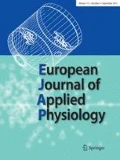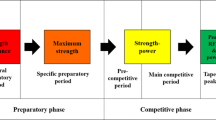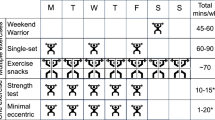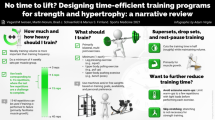Abstract
Purpose
Recent evidence suggests that deception may not be necessary for placebos to improve clinical outcomes. We tested the hypothesis that placebo and open-label placebo (OLP) treatments would acutely improve strength and voluntary activation, as well as minimize neuromuscular fatigue, in untrained participants.
Methods
Twenty-one males (n = 11) and females (n = 10) visited the laboratory on three occasions (placebo, OLP, control) to receive each treatment in a randomized, counter-balanced manner. Trials involved a pretest, a 15-min intervention, and posttests. For the placebo trial, participants were informed that they would be ingesting a capsule that would improve their performance and make them feel more energetic. For the OLP intervention, participants were told that the capsules would have no effects. In “Experiment #1”, knee extensor maximal voluntary contraction (MVC) peak torque and percent voluntary activation were evaluated. In “Experiment #2”, participants performed 20 consecutive MVCs while surface electromyographic signals were detected from the vastus lateralis. Subjective assessments of energy and perceived exertion were examined.
Results
The interventions had no effect on strength or voluntary activation, but energy levels increased following treatments (p = 0.016, η2 = 0.257). Neither treatment influenced neuromuscular fatigue. Though some variables showed moderate-to-large effect sizes, these results were consistent for individuals with lower voluntary activation.
Conclusion
Placebo and OLP treatments had minimal influence on strength, voluntary activation, and fatigue resistance. As these findings differ from recent reports, we speculate that placebos and OLPs are more likely to enhance muscle function in patient populations seeking medical care.




Similar content being viewed by others
Abbreviations
- ANOVA:
-
Analysis of variance
- OLP:
-
Open-label placebo
- MVC:
-
Maximal voluntary isometric contraction
- RMS:
-
Root-mean-squared
- ITT:
-
Interpolated twitch technique
- EET:
-
Electrically evoked torque
- EMG:
-
Electromyographic
References
Ariel G, Saville W (1972) Anabolic steroids: the physiological effects of placebos. Med Sci Sport Exerc 4:124–126
Balshaw TG, Fry A, Maden-Wilkinson TM, Kong PW, Folland JP (2017) Reliability of quadriceps surface electromyography measurements is improved by two vs. single site recordings. Eur J Appl Physiol 117(6):1085–1094. https://doi.org/10.1007/s00421-017-3595-z
Basmajian JV, De Luca CJ (1985) Muscles alive, 5th edn. Williams and Wilkins, Baltimore
Beedie CJ, Foad AJ (2009) The placebo effect in sports performance: a brief review. Sports Med 39(4):313–329. https://doi.org/10.2165/00007256-200939040-00004
Beedie CJ, Stuart EM, Coleman DA, Foad AJ (2006) Placebo effects of caffeine on cycling performance. Med Sci Sports Exerc 38(12):2159–2164. https://doi.org/10.1249/01.mss.0000233805.56315.a9
Borg G (1998) Borg’s perceived exertion and pain scales, 1st edn. Human Kinetics, Washington
Burke MJ, Kaptchuk TJ, Pascual-Leone A (2018) Challenges of differential placebo effects in contemporary medicine: the example of brain stimulation. Ann Neurol. https://doi.org/10.1002/ana.25387
Button DC, Behm DG (2008) The effect of stimulus anticipation on the interpolated twitch technique. J Sports Sci Med 7(4):520–524
Carvalho C, Caetano JM, Cunha L, Rebouta P, Kaptchuk TJ, Kirsch I (2016) Open-label placebo treatment in chronic low back pain: a randomized controlled trial. Pain 157(12):2766–2772. https://doi.org/10.1097/j.pain.0000000000000700
Clark BC, Taylor JL (2011) Age-related changes in motor cortical properties and voluntary activation of skeletal muscle. Curr Aging Sci 4(3):192–199
Clark BC, Mahato NK, Nakazawa M, Law TD, Thomas JS (2014) The power of the mind: the cortex as a critical determinant of muscle strength/weakness. J Neurophysiol 112(12):3219–3226. https://doi.org/10.1152/jn.00386.2014
Clark BC, Taylor JL, Hong SL, Law TD, Russ DW (2015) Weaker seniors exhibit motor cortex hypoexcitability and impairments in voluntary activation. J Gerontol Ser A Biol Sci Med Sci 70(9):1112–1119. https://doi.org/10.1093/gerona/glv030
de Craen AJ, Roos PJ, de Vries AL, Kleijnen J (1996) Effect of colour of drugs: systematic review of perceived effect of drugs and of their effectiveness. BMJ 313(7072):1624–1626
Deschenes MR, McCoy RW, Holdren AN, Eason MK (2009) Gender influences neuromuscular adaptations to muscle unloading. Eur J Appl Physiol 105(6):889–897. https://doi.org/10.1007/s00421-008-0974-5
Fassler M, Meissner K, Schneider A, Linde K (2010) Frequency and circumstances of placebo use in clinical practice–a systematic review of empirical studies. BMC Med 8:15. https://doi.org/10.1186/1741-7015-8-15
Finniss DG, Kaptchuk TJ, Miller F, Benedetti F (2010) Biological, clinical, and ethical advances of placebo effects. Lancet 375(9715):686–695. https://doi.org/10.1016/S0140-6736(09)61706-2
Herda TJ, Walter AA, Costa PB, Ryan ED, Hoge KM, Stout JR, Cramer JT (2011) Percent voluntary inactivation and peak force predictions with the interpolated twitch technique in individuals with high ability of voluntary activation. Physiol Meas 32(10):1591–1603. https://doi.org/10.1088/0967-3334/32/10/007
Hermens HJ, Freriks B, Disselhorst-Klug C, Rau G (2000) Development of recommendations for SEMG sensors and sensor placement procedures. J Electromyogr Kinesiol 10(5):361–374
Hoenemeyer TW, Kaptchuk TJ, Mehta TS, Fontaine KR (2018) Open-label placebo treatment for cancer-related fatigue: a randomized-controlled clinical trial. Sci Rep 8(1):2784. https://doi.org/10.1038/s41598-018-20993-y
Howick J, Bishop FL, Heneghan C, Wolstenholme J, Stevens S, Hobbs FD, Lewith G (2013) Placebo use in the United kingdom: results from a national survey of primary care practitioners. PLoS ONE 8(3):e58247. https://doi.org/10.1371/journal.pone.0058247
Jutte R (2013) The early history of the placebo. Complement Ther Med 21(2):94–97. https://doi.org/10.1016/j.ctim.2012.06.002
Kam-Hansen S, Jakubowski M, Kelley JM, Kirsch I, Hoaglin DC, Kaptchuk TJ, Burstein R (2014) Altered placebo and drug labeling changes the outcome of episodic migraine attacks. Sci Transl Med 6(218):218ra215. https://doi.org/10.1126/scitranslmed.3006175
Kaptchuk TJ, Miller FG (2015) Placebo effects in medicine. N Engl J Med 373(1):8–9. https://doi.org/10.1056/NEJMp1504023
Kaptchuk TJ, Friedlander E, Kelley JM, Sanchez MN, Kokkotou E, Singer JP, Kowalczykowski M, Miller FG, Kirsch I, Lembo AJ (2010) Placebos without deception: a randomized controlled trial in irritable bowel syndrome. PLoS ONE 5(12):e15591. https://doi.org/10.1371/journal.pone.0015591
Kelley JM, Kaptchuk TJ, Cusin C, Lipkin S, Fava M (2012) Open-label placebo for major depressive disorder: a pilot randomized controlled trial. Psychother Psychosom 81(5):312–314. https://doi.org/10.1159/000337053
Maganaris CN, Collins D, Sharp M (2000) Expectancy effects and strength training: do steroids make a difference? Sport Psychol 14(3):272–278. https://doi.org/10.1123/tsp.14.3.272
McClung M, Collins D (2007) “Because I know it will! ”: placebo effects of an ergogenic aid on athletic performance. J Sport Exerc Psychol 29(3):382–394
Mestre TA, Ferreira JJ (2017) Are placebo pills presented as experimental treatment a true placebo? Pain 158(3):535. https://doi.org/10.1097/j.pain.0000000000000793
Nuzzo JL, Taylor JL, Gandevia SC (2019) CORP: measurement of upper and lower limb muscle strength and voluntary activation. J Appl Physiol 126(3):513–543. https://doi.org/10.1152/japplphysiol.00569.2018
Oki K, Clark LA, Amano S, Clark BC (2017) Effect of anodal transcranial direct current stimulation of the motor cortex on elbow flexor muscle strength in the very old. J Geriatr Phys Ther. https://doi.org/10.1519/JPT.0000000000000145
Pageaux B, Lepers R (2016) Fatigue induced by physical and mental exertion increases perception of effort and impairs subsequent endurance performance. Front Physiol 7:587. https://doi.org/10.3389/fphys.2016.00587
Park ND, Maresca RD, McKibans KI, Morgan DR, Allen TS, Warren GL (2008) Caffeines enhancement of maximal voluntary strength and activation in uninjured but not injured muscle. Int J Sport Nutr Exerc Metab 18(6):639–652
Pietrosimone BG, Selkow NM, Ingersoll CD, Hart JM, Saliba SA (2011) Electrode type and placement configuration for quadriceps activation evaluation. J Athl Train 46(6):621–628
Sandler AD, Bodfish JW (2008) Open-label use of placebos in the treatment of ADHD: a pilot study. Child Care Health Dev 34(1):104–110. https://doi.org/10.1111/j.1365-2214.2007.00797.x
Schaefer M, Sahin T, Berstecher B (2018) Why do open-label placebos work? A randomized controlled trial of an open-label placebo induction with and without extended information about the placebo effect in allergic rhinitis. PLoS ONE 13(3):e0192758. https://doi.org/10.1371/journal.pone.0192758
Stevens JP (2007) Intermediate statistics: a modern approach, 3rd edn. Taylor & Francis Group, New York
Tilburt JC, Emanuel EJ, Kaptchuk TJ, Curlin FA, Miller FG (2008) Prescribing “placebo treatments”: results of national survey of US internists and rheumatologists. BMJ 337:a1938. https://doi.org/10.1136/bmj.a1938
Weir JP (2005) Quantifying test-retest reliability using the intraclass correlation coefficient and the SEM. J Strength Cond Res 19(1):231–240. https://doi.org/10.1519/15184.1
Weissgerber TL, Milic NM, Winham SJ, Garovic VD (2015) Beyond bar and line graphs: time for a new data presentation paradigm. PLoS Biol 13(4):e1002128. https://doi.org/10.1371/journal.pbio.1002128
Author information
Authors and Affiliations
Contributions
AS, DF, JS, and MS conceived and designed the research. AS, RM, DK, and MS conducted the laboratory experiments. AS, RM, DK, and MS analyzed the data. AS and MS wrote the manuscript. All the authors read and approved of the final manuscript.
Corresponding author
Ethics declarations
Conflict of interest
All investigators declared no conflicts of interest in the reporting of this research.
Additional information
Communicated by William J. Kraemer.
Publisher's Note
Springer Nature remains neutral with regard to jurisdictional claims in published maps and institutional affiliations.
Rights and permissions
About this article
Cite this article
Swafford, A.P., Kwon, D.P., MacLennan, R.J. et al. No acute effects of placebo or open-label placebo treatments on strength, voluntary activation, and neuromuscular fatigue. Eur J Appl Physiol 119, 2327–2338 (2019). https://doi.org/10.1007/s00421-019-04219-1
Received:
Accepted:
Published:
Issue Date:
DOI: https://doi.org/10.1007/s00421-019-04219-1




